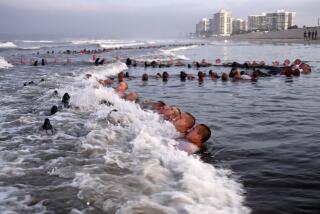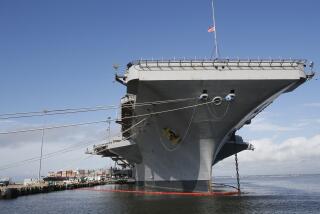Bush Team Plans to End Vieques Bomb Training
- Share via
WASHINGTON — Facing intensifying opposition, the Bush administration is planning to withdraw the Navy from the Puerto Rican island of Vieques and seek another spot to conduct the Atlantic fleet’s bombing exercises, a defense official said Wednesday.
Navy Secretary Gordon England will announce, probably today, that he will convene a panel to search for a new training site, with the goal of ending Vieques exercises by May 2003. While England is making no guarantee other arrangements for training can be made, he believes they can, the official said.
That would probably mean, however, that the Navy will need to develop a fundamentally different approach to the training that it has long insisted is essential to the readiness of the Atlantic fleet.
Critics have contended that the large-scale exercises brought danger, noise and pollution that jeopardized the health of the idyllic island’s 9,300 residents. Opposition to the exercises grew two years ago after a civilian guard was killed on the range by a stray bomb. The Navy has since stopped using live ammunition.
The issue has recently developed into an increasingly violent standoff and has put the Bush administration publicly at odds with Puerto Rican officials at a time when it is courting Latino voters.
Rep. Jose E. Serrano (D-N.Y.), a frequent critic of the bombing, said Wednesday that he had no official word on the White House plans. But, he said, if the Navy were to “stop all bombing and plan to leave in 2003, then that’s something we can look at favorably.
“But if they continue the bombing and say they’re leaving in 2003, then that’s unacceptable because the people in Puerto Rico and on Vieques and those of us in the 50 states who are involved in this issue want the bombing to stop immediately,” Serrano told Reuters.
Protesters have been preparing in recent days to try to disrupt exercises scheduled for next week that will involve 60 planes dropping dummy bombs on targets at Navy installations. On Wednesday, a group of surface ships and submarines carrying 10,000 Navy personnel began another set of exercises in waters 75 miles south of the island.
The defense official, who asked not to be named because the official announcement is still pending, said England made the decision to seek a new venue.
But Associated Press reported that the decision came after a White House meeting between England, senior White House political strategist Karl Rove, deputy national security advisor Stephen Hadley and Deputy Defense Secretary Paul Wolfowitz.
The Navy has conducted exercises on Vieques for 60 years and has contended that it needed combined air, sea and amphibious training. Battle groups are trained at the island before heading across the Atlantic for missions in Europe and Asia.
In a recent letter to The Times, Navy Vice Adm. John B. Nathman stressed that at Vieques the Navy personnel “are training for combat. In this year alone, there have been more than 200 separate incidents of Iraqi surface-to-air missile and antiaircraft artillery fire directed against Navy and coalition aircraft . . . in the no-fly zones over northern and southern Iraq.”
He said that last year the Harry S. Truman battleship group was forced to miss training at Vieques and was then deployed to the Persian Gulf “into combat conditions without an adequate level of live-fire training.”
The Navy has denied allegations that the bombing exercises, which have gone on for six decades, have jeopardized the safety or health of Vieques residents.
The Navy had been pinning its hope to continue the exercises on a deal worked out with the Clinton administration under which islanders are scheduled to vote in November on whether the Navy must leave in 2003.
Even as administration officials were making plans in Washington to withdraw, a Navy spokesman, Lt. Corey Barker, said: “We have the strongest Navy in the world and we need to keep our sailors trained in these types of conditions to keep it that way.”
Asked about reports that the administration was planning to leave, another spokesman said: “We have not made any decision changing our current status on Vieques. We continue to explore the best ways to achieve our overarching objective, which is to effectively train deploying naval forces.”
As months have passed, more activists and elected officials have agitated for an end to the exercises.
This week, Puerto Rican Gov. Sila Calderon arrived on Vieques to attend a prayer ceremony with residents, most of whom are American citizens. During bombing exercises in late April and early May, about 180 people were arrested on charges of trespassing on government property. The Rev. Al Sharpton, Bronx Democratic Party Chairman Roberto Ramirez and New York state legislator Jose Rivera were among those arrested.
Actor Edward James Olmos and Robert F. Kennedy Jr. have also been arrested in Vieques demonstrations.
New York’s Republican governor, George Pataki, has also been lobbying the Bush administration for a halt to the bombing.
To prepare for next week’s maneuvers, about 200 officers are to stand guard around the fence dividing Navy from civilian lands. Any protesters who try to enter the restricted area will be arrested, Puerto Rico’s Supt. of Police Pierre Vivoni said Wednesday.
The Navy has considered a range of other sites, including in the Caribbean and the Gulf of Mexico, but has concluded that, for reasons of cost and environmental impact, none would be practical.
The Navy’s predicament at Vieques has been the most visible example of the pressures all the services face from their civilian neighbors affected by their activities. Senior Pentagon officials have been increasingly concerned that they will be forced to give up more of their activities--overseas as well as in the United States--because of the objections of civilian populations.
More to Read
Sign up for Essential California
The most important California stories and recommendations in your inbox every morning.
You may occasionally receive promotional content from the Los Angeles Times.














